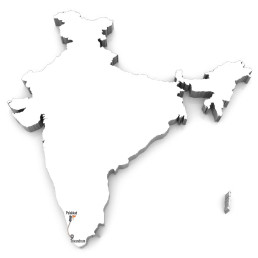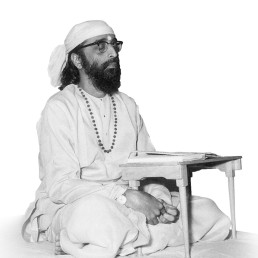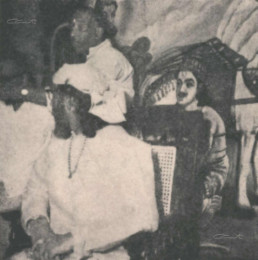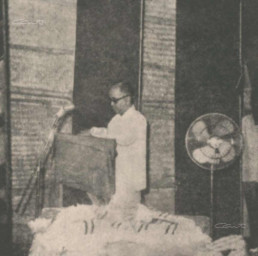
Jnana Yajna 85

Year & Dates:
April 24, 1961 to May 05, 1961

Yajna Topic:
Shrimad Bhagavad Gita- Chapter 15

Place:
Palakkad (Palghat), India.
Through repetition and reflection, onward to Realization – Pujya Gurudev demonstrated this indispensable formula for spiritual evolution in His every step and every Jnana Yajna. The people who followed Him from Thiruvananthapuram to Palakkad may perhaps have glimpsed that when they listened to the sacred 15th chapter of Shrimad Bhagavad Gita one more time at the grounds of Government College, Palakkad. Even though they heard it again, the teacher par excellence brought forth another subtlety, another striking interpretation which astounded seekers. His expressions varied like the patterns in a kaleidoscope and fascinated both seasoned followers and aspirants who heard Him for the first time.
With such reverent expectations, the collector of Palakkad (Palghat), Sri Rama Varma Kochappan Thampuran, who was also the president of the yagna committee received Pujya Gurudev at the gates to the College grounds where the yajnashala stood eager and packed.
A Master Preceptor and Motivator
It was another crisp beginning, and the hoisted Om flag indicated that another unforgettable Jnana Yajna had commenced on the evening of April 24, 1961; it was the fourth Jnana Yajna hosted in the first 108-yajnas series at Palakkad, and the audience of Palakkad were primed and ready for the swift pace and focused learning. As Pujya Gurudev painted the picture of the mystical ‘tree of samsara,’ and instructed the ways to cut down the trapping roots of bondage, the audience visualized and absorbed with deep regard. Pujya Gurudev Himself had referred to the chapter 15 – Purushottama Yoga – as the rarest piece of spiritual literature which came closest to defining the Indefinable. So, when He explained verse after verse, the all-pervasive and beyond-all, the discourses were truly pure meditation.
Vedanta Non-stop: Wherever Pujya Gurudev went, a spiritual ripple effect was established. So, in addition to Gita chapter 15 in the evenings in Palakkad from 6 pm to 8 pm, the town of Kollengode (14 miles away from Palakkad) was blessed with Pujya Gurudev’s discourses on Vivekachoodamani in the mornings from 6 am to 7 am. He then traveled back to the Palakkad Government College auditorium to conduct Kenopanishad classes from 8 to 9 in the morning.
Motivating Moments: Apart from His yajna commitment, on April 26th, Pujya Gurudev inaugurated the Rashtriya Swayam Sevak’s (RSS) Camp at Nurani, the place where cadets from all southern states trained intensely for a month. Calling for value-based actions aligned with our Vaidicka (Vedic) scriptures, He defined “a Bharatiya is one who revels in his own self-effulgence.”
Stopping at Kalady, the birthplace of Adi Shankara on April 30th, He presided over the Silver Jubilee celebration of the Advaita Ashram & College there. The very next day, He went to Tattamangalam, about 15 miles away, to give an encouraging address during a meeting organized by the Devi Group and the local Bala Vihar. After the Jnana Yajna was completed, He thrilled the children in the three-day Bala Vihar camp at Kollengode, awarding prizes and participating in the valedictory ceremony.
We reflect…In all the haste of events one after another, Pujya Gurudev displayed superb harmony in thought, word, and deed. It was as if events moved around Him while He was centered on That Purushottama.
Photo Gallery

“Think,” Says Pujya Gurudev
‘Nor sun nor moon, nor fire illumine That’:- Herein is enumerated almost all the sources of light, blessed by which the physical eyes experience vision. To see a thing is to know the things; and in order that the organ of vision might use its powers of seeing, it is not only sufficient that objects are in front of it but they must also be bathed in light. In a medium of light alone can the eyes illumine the sounds, the nose illumines the smell, the tongue perceives the tastes. The skin understands the touch. Each instrument illuminates its objects. Nor even this is the all. We can perceive our feelings, and we do perceive our ideas. The “light” in which we perceive thus all our sense objects, all our emotions, and all our thoughts, is the Light of Consciousness, by which alone we become Aware of all our experiences.
From Tyagi Magazine
God alone knows God!
Remember that we are mere instruments for the divine to express through. Our limitations prevent us from realizing the divine, likening the process to a dreamer awakening to reality, where the ego and mortal limitations dissolve into the infinite. Ultimately, the journey towards realizing the divine involves transcending our individual identities to merge with the boundless ocean of consciousness.

